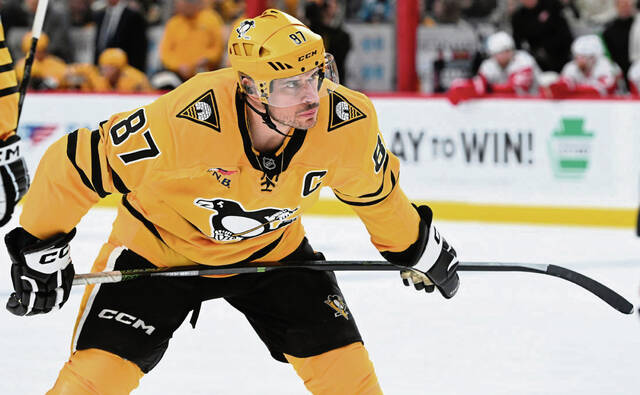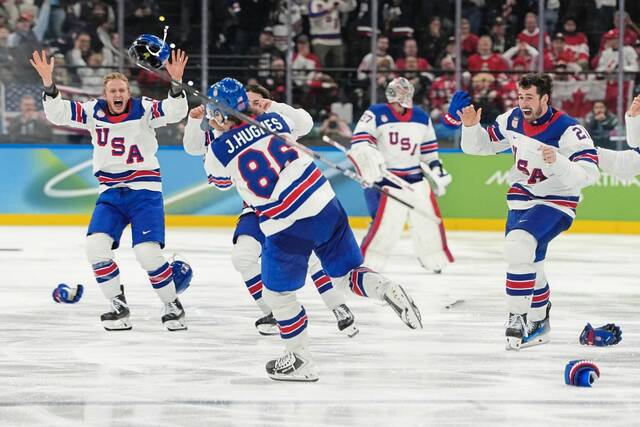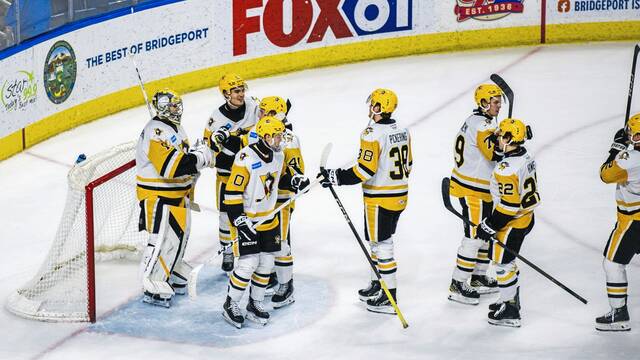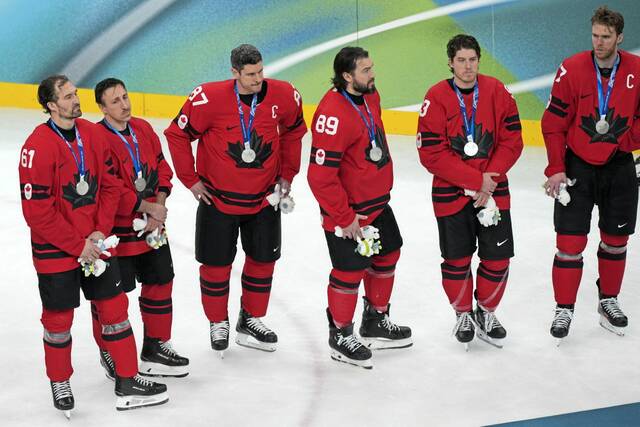When the Pittsburgh Penguins staged part of their September 1990 training camp in Vail, Colo., there were plenty of newcomers.
One of them was veteran center Bryan Trottier, who, at the time, was a 34-year-old All-Star with four Stanley Cup rings and a handful of individual trophies on his resume, to say nothing of a world of experience as an NHLer.
Another was an 18-year-old from the former Czechoslovakia named Jaromir Jagr. The team’s first-round pick in the 1990 NHL Draft three months earlier, Jagr might have known as many words in English as Trottier had championship rings.
So having them bunk together in the Rocky Mountains might have seemed like an odd pairing, but putting the venerable Trottier with the impressionable Jagr paid dividends.
Especially for Trottier.
“I built an early trust with him,” Trottier said. “One of the first things he did when his mom (Anna) came over to visit was he brought these ‘sweet buns,’ he called them. He called me ‘Big Bryan.’ He goes, ‘Big Bryan, you get sweet buns today. Thank you for all you do for me. My mom made sweet buns. You get some sweet buns.’ Nobody else got sweet buns but me and Jaromir that day.”
“He wanted to be the best. He’d tell me that every day. ‘You help me be the best. You help me. I learn. I’ll be like Mario. I’ll be the best.’ That’s high aspirations.”
Those aspirations were realized throughout Jagr’s dazzling career as an NHL superstar throughout the 1990s and 2000s and as one of the most dominant and important players in the history of the Penguins.
As a result, he will get to be like long-time teammate Mario Lemieux when he has his iconic No. 68 retired by the team Feb. 18 before a game against the Los Angeles Kings.
The team announced its long-anticipated plans to recognize Jagr on Friday afternoon.
To date, Lemieux (No. 66) and forward Michel Briere (No. 21), who died as a result of an automobile accident in 1971 after a promising rookie season, are the only players to have received this honor from the franchise.
Jagr’s credentials are more than worthy of such recognition.
A member of the Penguins for 11 seasons, Jagr helped the franchise win its first two Stanley Cup titles in 1991 and 1992.
Selected to six All-Star Games as a member of the Penguins, Jagr won the Art Ross Trophy five times as the NHL’s leading scorer during his time with the franchise and earned the Hart Memorial Trophy in 1998-99 as league MVP. Additionally, in 1999 and 2000, he was named recipient of the Lester B. Pearson Award — today known as the Ted Lindsay Award — which recognizes the NHL’s most outstanding player as determined by the NHL Players’ Association.
Jagr, who served as the Penguins’ captain for three seasons between 1998-2001, is the franchise’s fourth-leading career scorer with 1,079 points (439 goals, 640 assists) in 806 games.
Beyond his Penguins tenure, Jagr has the second-most points in NHL history (1,921), trailing the legendary Wayne Gretzky (2,857).
“Individually, he could dominate a game,” former Penguins forward Kevin Stevens said by phone Friday. “Mario could dominate a game, Gretzky could dominate a game and Jagr could dominate a game. Those guys were so dominant with the puck. They didn’t need other guys to play with. He could dominate the game by himself.”
The typically loquacious Trottier was stricken by a poverty of vocabulary when asked to explain Jagr the player.
“Dynamic isn’t a big enough word,” Trottier said. “Some of (Jagr’s) plays are iconic. They’re Mario Lemieux-ish. I don’t know the right adjective to use. He’s certainly unique in the sense that there’s nobody like him who has played the game, and there’s been nobody like him since.”
Even beyond his spectacular on-ice talents, Jagr was largely an icon of the franchise, even if much of his time with the Penguins saw him get overshadowed by Lemieux.
“Jagr was like a different icon,” former Penguins forward Jay Caufield said. “He was a different type. Mario, that’s the king, and Jaromir was right with him. And just grew to be a superstar right from that first (Stanley Cup) run. Just got better and better and better.
“He was just a different style. A different type of player.”
Differences with management as well as the Penguins’ financial woes in the late 1990s and early 2000s led to a messy divorce between Jagr and the team.
In July 2001, he was traded to the Washington Capitals in what was essentially a salary dump. That led to Jagr embarking on a largely nomadic existence in hockey for the better part of two decades. In addition to the Capitals, Jagr suited up for the New York Rangers, Philadelphia Flyers, Dallas Stars, Boston Bruins, New Jersey Devils, Florida Panthers and Calgary Flames.
Sprinkled in were repeated stops with Avangard Omsk, a team based in Siberia that competes in Russia’s Kontinental Hockey League, and Rytiri Kladno, a franchise he owns in his native Czechia.
In 2011, Jagr publicly flirted with rejoining the Penguins as a free agent, only to spurn their offer and instead sign with the rival Flyers of all teams.
That episode soured what was already a strained relationship.
Lemieux, who was a controlling owner of the franchise before selling most of his stake to Fenway Sports Group in 2021, had longed to reunite Jagr with the Penguins.
“That’s an honor to have somebody say they’re going to retire your number and what you meant to the city, what you meant to the Penguins,” said Caufield, a friend of Lemieux. “That’s wonderful that they got this done. I know Mario was always behind something to finally get that accomplished.”
Jagr, 51, was still an active professional player as recently as last season, having suited up for Rytiri Kladno. He indicated in September that he intends to play this season, though he has yet to appear in a game. His number will be retired by the Penguins three days after his 52nd birthday, Feb. 15.
The majority of his professional career has seen him wear a different jersey than the Penguins’. But even with the gulf of 22 years since his acrimonious departure in 2001, Jagr is still synonymous with the franchise he started his NHL career with in 1990.
“He was always a Penguin,” Stevens said. “I know when anybody talked about Jaromir, they talk about what happened in Pittsburgh. It wasn’t about the Rangers or the Bruins or wherever (else) he played. He’s always known as a Penguin.”
Jagr proclaimed he was “coming home” in a video announcing the honor that was posted on the team’s social media accounts.
“The way he talks about Pittsburgh is the way I talk about Pittsburgh,” Trottier said. “The support, the fans, just how everybody rallies around sports. It’s a special city in that regard. … I know Jaromir as a person. His love here in Pittsburgh is deep. I’m glad he’s coming home to celebrate that relationship.”







